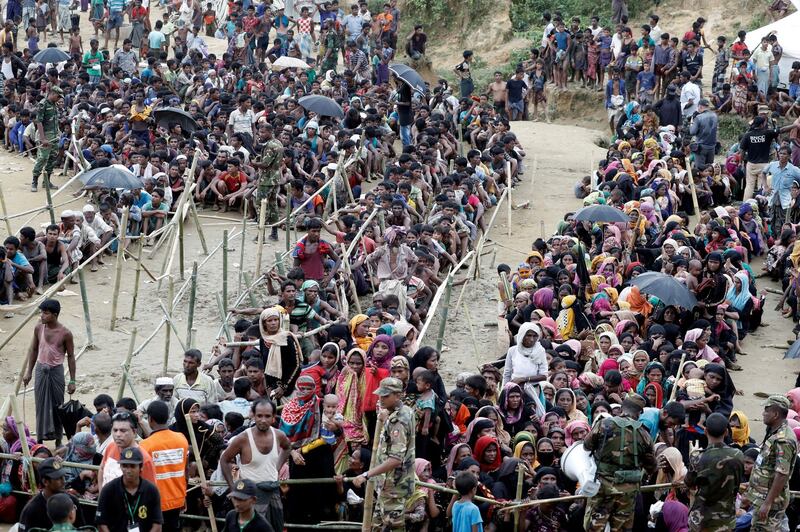Former Myanmar lawmakers who operate as a shadow government since a military coup a year ago said they now accept the authority of the top international court to decide if a 2016-17 campaign against Rohingya Muslims in the country constituted a genocide.
The National Unity Government (NUG) said in a statement Tuesday that that it would withdraw all preliminary objections in the International Court of Justice (ICJ) case over Myanmar’s military operations against the Rohingya in 2016 and 2017, a scorched-earth campaign that forced 730,000 Rohingya to flee Rakhine state, mostly to neighboring Bangladesh.
The parallel government asked that it and not the ruling military junta that took over Myanmar in the Feb. 1, 2021 putsch represent the country before the court.
In 2019, then-leader Aung San Suu Kyi staunchly defended the Myanmar military against genocide and crimes against humanity charges in 2019 at the International Court of Justice in The Hague in the case brought forth by Gambia.
Aung San Suu Kyi and her spokesman insisted at the time that no genocide had occurred in Rakhine state, and said that a Myanmar government investigation found war crimes and serious human rights violations had occurred during counter-terrorism operations in the area, but there was no “genocidal intent.”
The Gambia case charges that Myanmar violated the 1948 Genocide Convention during the alleged expulsion of Rohingya to Bangladesh. The hearing on the objections was scheduled to begin Feb. 21.
In Tuesday’s statement, the NUG’s acting President Duwa Lashi La said the group was the “proper representative of Myanmar” in the case, urging the court not to recognize the junta that deposed the government.
“It would set a dangerous precedent and be inconsistent with the position of the U.N. General Assembly for the ICJ to accept the military junta as the representative of Myanmar. The NUG strongly believes that it would also be detrimental to the interests of Myanmar and the people of Myanmar and to the cause of justice for the Rohingya people,” the statement said.
“Should the ICJ recognize the military, it would embolden the junta to continue and escalate its daily atrocity crimes,” it said.
The statement is a good sign, Tun Khin, a Rohingya activist from the London-based Burmese Rohingya Organization UK, told RFA’s Myanmar Service.
“The military council has been committing killings and atrocities in other ethnic states including Chin, Kachin or Kayin states. I think conditions are heading toward committing genocide against these ethnic groups. So, I think NUG’s reversal on the objection of genocidal charges earlier is good for the future,” Tun Khin said.
“I think NUG’s decision to cooperate with international legal body is a sign of optimism.”
But the NUG lacks the power to withdraw the objections, Nandaw Thar Ba, a Buddhist monk from Sittwe, Rakhine state, and chairman of the nationalist group Ma Ba Tha, told RFA.
"The NUG cannot recant its earlier position because NUG is not a legitimate government," he said. "The military is now ruling party of the country. The military council has more authority on this issue. No country has formally recognized NUG so far."
Nandaw Thar Ba noted that Aung San Suu Kyi has never formally relinquished her rights as Myanmar’s legal representative in the case and might not even be aware the NUG is recanting her arguments.
Recanting of arguments at the ICJ breaks new ground, Min Lwin Oo, a human rights attorney, told RFA.
“The NUG has abandoned the option for the defense entirely and wants to restart the entire trial from the beginning. It is up to ICJ on whether they will allow it or not,” he said.
RFA contacted the junta’s spokesperson, Maj. Gen. Zaw Min Tun, the NUG’s human rights minister, Aung Myo Min, and the NUG-endorsed ambassador to the U.N., Kyaw Moe Htun, but none were available for comment as of Wednesday evening.

Rohingya activist groups in Bangladesh also welcomed the NUG statement.
“Aung San Suu Kyi’s National Unity Government’s withdrawal of its previous objection to the International Court of Justice is an encouraging development for us,” Md Jubair, secretary of the Arakan Rohingya Society for Peace and Human Rights, told BenarNews, an RFA-affiliated online news service Wednesday.
“This withdrawal, I think, would bring the verdict in favor of the Rohingya. … It would formally establish the fact at the international level that the Myanmar military has been carrying out systematic torture, persecution and genocide against the Rohingya,” said Jubair, adding that the decades-old persecution of the Rohingya could finally cease if the case goes their way.
Dil Mohammad, a Rohingya leader living in the frontier land along the Bangladesh-Myanmar border, told BenarNews that the withdrawal of the objections could expediate a trial.
“If everything goes in the right direction, the Rohingya will get justice through the ICJ,” Dil Mohammad said.
But he said support from the international community was more important.
“Unless there is international pressure on the Myanmar government, the Rohingya will never be able to return to our homeland, even if the judgement from the ICJ goes in our favor,” Dil Mohammad said.
The military junta has been trying to get recognition from the international community. It has been engaging with the ICJ by every six months, submitting reports on the Rohingya situation, Reuters reported.
If it regains power from the military, the NUG in June 2021 pledged to grant citizenship to the Myanmar’s ethnic Rohingya. But it said “more discussion” would be needed to determine whether the Rohingya community will be recognized as a national ethnic group.
Additional reporting by Sunil Barua in Cox’s Bazar, Bangladesh, and Kamran Reza Chowdhury in Dhaka. Translated by Ye Kaung Myint Maung. Written in English by Eugene Whong.
